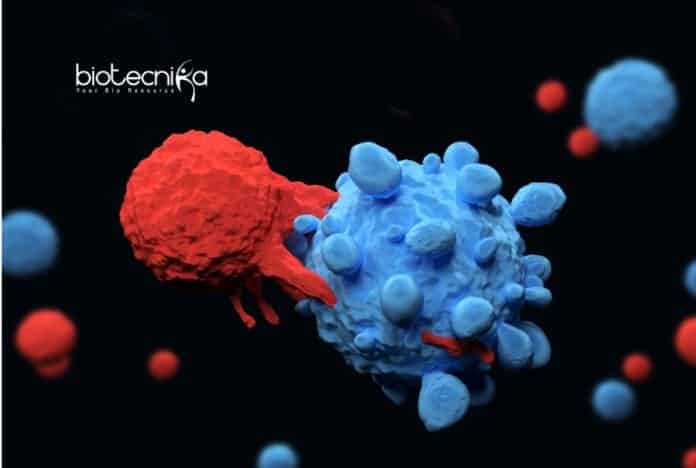T-Cells-Mesh Shrinks Solid Tumors – Thin Metal Mesh Loaded with T Cells
What if a metal that’s already used to keep arteries from clogging, straighten teeth and repair broken bones could be used to put an end to the spreading of cancer?
For the first time, researchers from Fred Hutchinson Cancer Research Center show that a small piece of thin metal mesh, loaded with cancer-fighting T-cells can shrink tumors in ovarian cancer preclinical models.
A faculty member in the Fred Hutch Clinical Research Division and the study’s lead author, Dr. Matthias Stephan says, ” In blood cancers, fighting cancers with cell therapies have been greatly successful but in solid tumors, cell therapies have not worked. In our findings, we show that T-cells loaded thin metal mesh can fight ovarian cancer and has cleared cancer in 70% of the treated mice, making this a significant step in creating effective cell therapies against solid tumors.”
Solid tumors like cancers of the pancreas, ovary, and breast, have many different tactics in hiding from and fighting back against the cancer-killing immune cells like CAR (chimeric antigen receptor) T-cells. Injecting anti-cancer cells has not worked as they do not reach the tumor or even if
they reach the cancerous cells, they are shed from the body as they tire out in trying to kill the cancerous cells.Materials that can carry cancer-fighting cells and that are safe to the human body are designed by Stephan. He says, ” Our ultimate goal is to make T-cell therapies easier to deliver to patients, being cheaper to make and faster in action, in addition to reducing side effects.”
Stephan’s latest study working towards that goal had a mesh-like metal film placed on tumors, with the porous mesh loaded with CAR T cells that target ovarian cancer.
The project was funded with the help of Monarch Biosciences (MonarchBio) and the scientists used a thin, almost translucent metal films made by them. These metal films are about seven times thinner than the average width of a human hair, measuring about 1 10 micrometers thick, which is 1 millionth of a meter. The film can be safely implanted within the body as it is made of nickel-titanium and other medical devices can also use it.
Minuscule spaces that can be configured into different patterns on the film were viewed under a powerful microscope. Drugs or other liquids can be filled up in these spaces and then implanted in the body, where the liquids find their targets by oozing out.
They wanted to check if the films could deliver the cancer-fighting cells to tumors and if it could hold the T-cells. Stephan said, ” A pattern on the film was to be found on which the T cells would work well. We had to find such a pattern that would not be too small making the T-cells cramped and not able to move and it had to be small enough so that the cells would not fall between the cracks.”
The pattern that worked best with T-cells was a pattern resembling a top-down view of a maze with straight lines. For the CAR T-cells to expand and grow once they are in the body, a combination of materials was used to coat the metal film.
CAR T-cells programmed to look for the marker for ovarian cancer cells, called ROR1, was loaded on the film, by the Fred Hutch team. On both sides of the film, these engineered cells were placed and then into the middle of the material, they were absorbed.
Stephan said, ” It is like marmalade spread on both sides of a bread piece. The bread represents the metal film and when CAR T-cells were put on both sides of it, they soak into the middle too.”
The scientists implanted the films loaded with CAR T-cells on the tumors using ovarian cancer lab models. The T-cells gravitated near the tumor and moved out of the film. In all the mice, the tumors disappeared within 10 days. 70% of the mice remained tumor-free within 20 days.
If this approach is confirmed by clinical trials and more studies, it can be used eventually in treating diseases like ovarian and pancreatic cancer, where, by implanting the film over it, the growth of the tumor can be controlled.
The Fred Hutch scientists found in another experiment reported in the same paper that a tube-like version of the film soaked with CAR T-cells kept tumors from growing into the tube. In cancers that cause obstruction of the digestive system or the airways, like pancreatic cancer or lung cancer, this approach could be made use.
Stephan said, ” This approach can also work with natural killer cells, T-cell receptor therapies and other types of immune cells that target cancer, though we focused only on CAR T-cells in the current experiment.”
The funding for the research was provided by the Bezos family, Fred Hutch, in addition to MonarchBio.
Editor’s Note: New T-Cells-Mesh Shrinks Solid Tumors, Metal Mesh, T-Cells-Mesh Shrinks Solid Tumors.
Author: Prathibha HC






























